- Home
- Agatha Frost
Claire's Candles Mystery 02 - Black Cherry Betrayal Page 5
Claire's Candles Mystery 02 - Black Cherry Betrayal Read online
Page 5
Claire’s two-bedroom cottage had been the one at the very end.
The side entrance to the park was a little further up, where the wall curved and then became another gated entrance. A red post-box stood on one side and a red bin for dog waste on the other. Two bollards and a spiked chain ran in front of the gates, with only enough room for people to squeeze around it one at a time.
Built on the large hill, Starfall Park was as wide as it was long. The side entrance opened up onto a path that immediately curved upwards, and the downward slope headed to the main entrance. The bottom of the park was arguably the steepest, hence why the locals took the slightly longer way around to do their red-faced climbing in the privacy of Park Lane’s shadows.
Flowers of every colour and kind were bedded along the edges of the path in both directions, with large and varied trees planted in abundance everywhere. The trail continued to climb, though an offshoot snaked off halfway towards the brightly coloured, enclosed, metal-frame children’s play area. At the peak of the hill, the path wound around until it finally flattened out at the observatory. Its domed lens was as iconic a part of Northash’s landscape as the Warton Candle Factory’s chimney.
Beneath the observatory, a large field of grass sloped downwards, levelling out around the children’s play area. A bandstand faced the flat area; the path wrapped around it. Beyond that, trees hid the secret network of narrow paths around the Chinese rock garden.
Beyond the observatory was a third entrance that looped around to the top of Park Lane. Up there stood a variety of historic cottages and houses built in the 1930s, and also happened to be where Sally lived.
There were two separate bowling greens, two tennis courts, a pond for ducks, and an enclosed area for rabbits. And the crowning jewel, right ahead of Em and Claire at the side entrance, was Starfall House, arguably the most impressive part of the whole park.
Built in the early 1800s, the grand manor was as much as part of the park as the park was part of the manor. The paths snaked around it, meeting at the other side behind the bandstand. A row of scattered trees, aged tall and wide, gave the house some privacy from the angle of the children’s play area and the duck pond and rabbit enclosure, but hiding a home so grand was ultimately impossible.
The park was impressive by anyone’s standards. Of course, it wasn’t uncommon for someone to be proud of some prestigious part of their hometown, no matter how lacking it might be in other areas. Other towns, however, didn’t have Starfall Park. It was special, and everyone within a ten-mile radius treasured it.
Rather than walking up the steep hill to enjoy what the park had to offer with everyone else, they cut straight across. Claire did something she’d never done in her thirty-five years in Northash: she crossed beyond the water fountain.
The grand marble fountain, once a watering hole for Victorians tired out by the walk, hadn’t been turned on in Claire’s memory, but it was still a significant landmark. It marked the invisible boundary between private and public land.
The park, owned by the village of Northash, was free for everyone. The house and its immediate surroundings belonged to Opal Jones. The people of Northash knew never to venture past the fountain or to cross from the path onto the grass. The courtesy was given out of equal measures of respect for and fear of the home’s elderly owner.
Whether by design or happy coincidence, the rear of the house faced both the main entrance and the side entrance to the park. The building’s grand entrance faced the much quieter and seldom-used area behind the bandstand and duck pond where all the paths converged into a patch of concrete lined with benches too deeply shaded to invite use. Each side of the building had five large windows set in the beige stone on the ground floor, and another five directly above, creating an apparently perfect square from the front angles.
Claire had always found the symmetry and simplicity appealing to the eyes – a real testament to the designers, considering it was two hundred years old. Rather than following the path next to the car park with enough room for six cars, they went to the back of the building, a later addition that didn’t match the grandeur of the original.
A small extension of dark, textured, dirty stone stuck out of the end of the clean, golden brick. The outfacing wall blended into a Victorian conservatory. Made from iron, the conservatory’s details were intricate and ornate, even under a century’s worth of thick green paint.
There were a couple of wicker chairs in the conservatory. Potted plants cluttered every surface. Some even hung from the ceiling, their green tendrils trying their best to grow down to the black and white tiled floor. It was cracked and a little grimy, and Claire suspected it was original.
Claire couldn’t believe she had already come so far. Rather than walking straight through the door, Em rattled the rope of a little black bell jutting out from the dirty stone.
“Remember,” Em said, pausing to inhale deeply through her nostrils, “try not to carry anything she says with you once you leave. She might be old, but don’t let it fool you. She means every word.”
Through the conservatory and a door with glass panels, Claire spotted a man in a heavy khaki overcoat drinking a glass of water by a sink. He glanced in their direction but turned away with his drink.
“That’s Colin,” Em explained. “Quiet soul. He’s the groundskeeper.”
Claire knew of him. His reputation as the grumpy groundskeeper preceded him, and Claire had experienced his wrath first-hand.
After almost a minute of waiting, a woman of around sixty ripped open the door, panting as though she had just run from the other side of the house. She had short hair, and at her age, the depth of the brown hue was one only dye could create. It was curled in neat rows, looking more suited to someone twenty years older. She wore a grey cardigan over a buttoned-down blouse, which she’d tucked into a pair of navy trousers with an ironed pleat down the middle.
The moment she noticed Em, her look of irritation at being called to the door dropped. Her brows tilted down at the edges, a sigh leaving her mouth as she rested her hand on her chest.
“Em,” she said on another heavy breath. “There are no words.”
“Then say none, Diane.” Em reached out and cupped Diane’s face much as she’d done with Claire. “How are you feeling?”
Like Claire, Diane looked taken aback by the question.
“I – I don’t really know,” she replied as Em released her face. “Are you here to see your grandmother?”
“I thought it was only right.”
“She’ll appreciate it,” Diane said, stepping to the side to let Em in. When her gaze took Claire in, she rested a finger on her chin. “I don’t think we’ve met?”
“Oh, this is Claire.” Em turned, her hands in a prayer position as she gave a small bow. “Please, forgive me. I should have introduced you.”
Claire smiled awkwardly, wanting to say ‘it’s fine, you’ve just found out your mother is dead’; it had been on the tip of her tongue since the gym.
“Claire . . . ?” Diane held out her hand, half-standing between the conservatory and the door.
“Harris.” Claire shook the woman’s hand. “Claire Harris. I . . . I found Jane.”
“Ah!” Diane quickly ushered Claire inside as though to suggest ‘say no more’; she closed the door behind them. Turning, her eyes dropped to take in the muddy bootprints on the black and white tiles identical to those in the conservatory except in much better condition. “For crying out loud, Colin! How many times must I tell you to take off your boots at the door? I’ve just mopped!”
Colin, around Diane’s age, if not a little closer to retirement, glared at her as he filled his pint glass at the large country kitchen sink. Maintaining eye contact, he gulped down a quarter of the pint. Droplets ran through his short, grey beard and onto the floor. Diane sighed, balling her fists on her hips. Colin tossed the remainder into the sink. Water splashed against the black marble counter. He slammed the glass down before pushing past
them and out through the back door, leaving his musky, woodsy scent thick in the air.
“And the glass?” Diane huffed as she scooped it up and put it into the sink. “That man will be the death of me, I swear it!”
“Am I okay to see my grandmother?”
“Of course, dear.” Diane smiled softly as she nodded at the door on the other side of the large kitchen. “You know where to find her.”
Em left, but, sensing she intended to speak with her grandmother alone first, Claire didn’t follow. Em didn’t look back as she closed the door.
“Is it so hard to wash a single glass, Colin?” Diane muttered as she scrubbed at the glass with a soapy sponge. “Honestly, I don’t know why I waste my breath.”
Through one of the tall windows on the left-hand wall of the kitchen, Claire spotted Colin hurrying across the grass, shovel in hand.
“This is private property!” he yelled at a young couple trying to settle down with a picnic blanket on the patch of grass between the house and path. “Can’t you read?”
Diane shook her head and huffed as she rinsed the glass under the water before griping under her breath, “Tourists.”
Claire knew Colin’s shovel and booming voice weren’t only used with the tourists. She and Sally had been on the receiving end when they’d just turned sixteen and Sally’s older brother, Ricky, bought them a bottle of low-alcohol cider to share. Choosing the observatory steps as their al fresco pub had resulted in a younger version of Colin appearing from thin air to shoo them away. The observatory, as far as Claire knew, was also private property owned by Opal Jones. Luckily for Claire, she’d hated the taste and hadn’t wanted a second sip.
“Where are my manners?” Diane turned, wiping her hands on the tea towel. “Can I get you a drink, my love? Or a slice of cake? I’ve just baked a fresh Victoria sponge for Opal. It’s her favourite. I don’t think it will cheer her up much, but that’s no reason not to try, is it?”
“I’m okay, thank you,” Claire said, inviting herself to a seat at the large wooden table in the centre of the old-fashioned kitchen clearly designed more for utility than for looks. “I just ate at Marley’s.”
“How is it in there?” Diane asked as she neatly folded the tea towel. “I so rarely get into the village. I keep my weekly hair appointment, and I sometimes go jogging around the square early of a morning for a change of scenery, but otherwise, I’m here. There’s always something to do, and the park is big enough to feel like its own little planet sometimes.”
Claire looked past Diane to the window and the people walking back and forth outside it. A couple of lads on bikes zoomed past, almost knocking over an older woman bending over to pick up her dog’s dirty business with a black bag. Claire couldn’t imagine looking out any window at home and seeing so much life within touching distance.
“It must have been awful.” Diane looped the towel over the gold handle of the antique black stove. “Jane, I mean. From what they’re saying. I can’t imagine it.”
“I certainly won’t forget it.” Claire exhaled, trying not to think about it. “Are you family?”
“Oh, no!” She chuckled as she pulled a glass cake stand from a shelf above a sizeable metal bread bin. “Although I might as well be. I’ve been here for forty solid years. I’m Opal’s lady in waiting, as it were. I suppose that’s an outdated term now, isn’t it? I think they call us housekeepers these days. Opal is rather traditional.” She cut into the cake with a large knife taken from a block. “Are you sure you won’t have a slice? I used Jane’s recipe. We used to share them with each other. I thought it would feel comforting, but it would be strange to eat it alone.”
Claire licked her lips, already tasting Jane’s signature Victoria sponge. Something about the thought of eating a dead woman’s recipe unsettled her suddenly, as delicious as the cake looked. Before she had to give an answer, a metal bell rang on the wall, jolting Claire but not Diane. She seemed used to it. It rang again, and a third and final time.
“That’s a summons,” Diane said, pulling out Claire’s chair. “She’ll want to see you, and it’s best not to keep her waiting for a first meeting, especially today of all days.”
Diane ushered Claire through the door on the other side of the room and into a large entrance hall panelled with dark wood. More of the black and white tiles covered the floor. The symmetry continued inside, with two large arches on each side of a full central staircase. There was a sitting room on one side and a dining room stroke library on the other.
Diane scurried up the grand staircase with the nimbleness of someone who had made the same journey multiple times a day for four decades.
Claire, on the other hand, wasn’t so fit. The staircase felt never-ending, and she made the rookie mistake of walking up the middle rather than on either side, where she might have used the bannister for support. If Diane wasn’t watching from the top, tapping her foot with her fists on her hips, Claire would have snaked to the edge.
Instead, she sped up as much as she could, feeling like she was keeping Her Majesty, Queen Elizabeth II herself waiting. She would have chuckled if she had the breath; now that she’d noticed it, there was something of Camila Parker-Bowles about Diane.
Embarrassed by her inherent lack of grace and fitness, Claire pulled herself onto the top step, wondering if it was normal for thighs to burn so much. Diane darted around the top landing, stopping at two white doors at the front of the house. When Claire finally caught up again, Diane opened the door and nodded for her to enter.
As Claire passed, Diane picked a ball of fluff off Claire’s denim shirt. If she’d known she were about to meet royalty, she would have gone home to change out of her decorating clothes. At least Opal couldn’t see how much her jeans were straining, although after climbing Mount Starfall, Claire could certainly feel it.
Em was in a red velvet armchair in the corner of the room, legs tucked against her chest. She stared through the front windows at the view of the rose bushes on the sloped lawn. Beyond that, a row of trees shielded them from the unsophisticated view of the back of the bandstand.
Even from inside the unfamiliar house, Claire knew exactly which room she’d entered. For as long as Claire could remember, Opal had sat silent and still at the window above the front door. Though not actually royalty, Claire was about to meet a local legend.
Diane pushed her further into the room before closing the door behind them. The room was so big the windows and low watt table lamps did little to illuminate it. From what Claire could see, it hadn’t been redecorated since before WWI. Em wafted her hand, motioning for Claire to approach Opal. Diane gave her another gentle shove.
Claire couldn’t help but notice how differently they grieved compared to her own family.
“Opal?” Claire said softly as she approached the wooden chair at the window. “My name is Claire.”
“I know who you are, girl.” Opal’s words bit, and her gaze never left the window. “And it’s Mrs Jones, to you.”
“I’m sorry.”
Em gave Claire a look she knew meant ‘remember what I told you’, so she tried. She inhaled, ready to let the old woman’s vitriol roll off her back like it was water, and she, one of the ducks in the pond. Just being able to say she’d spoken to Opal Jones put her in a rarefied group of people. Though she was often seen at the window, Opal hadn’t been spotted in the village in decades.
“Move into the light, girl,” Opal said, lifting a bony finger and pointing at the spot next to her chair. “I need to be able to see you.”
Claire moved into the brightness of the sun. The laughter of the children playing on the near climbing frames starkly contrasted with the coldness of the room and its long-time occupant.
Though Claire didn’t know Opal’s age, up close, she had to be the oldest person she had ever seen.
Opal’s liver-spotted and icily pale complexion, and an intricate network of lines and creases gave it the appearance of drying clay. Her hair was white and thin, pa
rted down the middle and combed slick to the head on either side and pulled into a bun.
Jane had always sported the same style, although Claire had never noticed so much of Jane’s scalp.
Opal’s eyes, which stared outwards, had glassy films of white over them, and for the first time in Claire’s life, she realised the woman hadn’t been sat there for years watching them after all; she was blind.
But she was not a woman to be pitied. Despite her frail state, Claire could practically feel the strength of her will. She stared at nothing with intensity, her mind clearly active behind the cloudy eyes. Opal glanced towards her, but not specifically at her, making Claire wonder if she could make out outlines, at least.
“Explain to me what you found,” she said, her tone an order and not a question. “Was she in a bad state of decay?”
Hearing the word DI Ramsbottom hadn’t been able to say lashed through the air as harshly as hearing her uncle’s name spoken aloud had done. Diane cleared her throat and Em dove from her chair for the door, slipping out silently. When the door closed, Opal blinked slowly, not seeming to miss a thing.
“Yes,” Claire answered honestly, scared to dance around the question. “She’d been up there for a few months. That’s what the police said.”
“I know what the police said, girl,” she snapped, her already wrinkled forehead creasing in the middle. Only a few sparse eyebrow hairs remained. “I know the facts.” She paused and inhaled through her nostrils. “Emma tells me you’re the young woman who has taken over my shop.”
Claire parted her lips to ask Opal for clarification, and then remembered the name of the landlord on all the paperwork she’d signed. They’d simply been referred to as Mrs Jones, and the rest of the property management was to be controlled by the estate agent, meaning Claire had no reason to ever know or contact her landlord. She hadn’t put the pieces together, and neither had Sally by the sounds of it. Claire gulped, somehow twice as nervous about saying the wrong thing.
“Answer me, girl!”

 Claire's Candles Mystery 02 - Black Cherry Betrayal
Claire's Candles Mystery 02 - Black Cherry Betrayal Peridale Cafe Mystery 20 - Cocktails and Cowardice
Peridale Cafe Mystery 20 - Cocktails and Cowardice Peridale Cafe Mystery 22 - Scones and Scandal
Peridale Cafe Mystery 22 - Scones and Scandal Claire's Candles Mystery 05 - Fresh Linen Fraud
Claire's Candles Mystery 05 - Fresh Linen Fraud Peridale Cafe Mystery 19 - Brownies and Bloodshed
Peridale Cafe Mystery 19 - Brownies and Bloodshed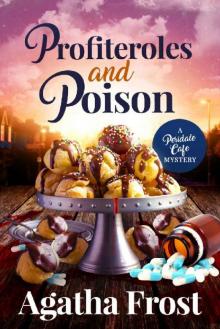 Peridale Cafe Mystery 21 - Profiteroles and Poison
Peridale Cafe Mystery 21 - Profiteroles and Poison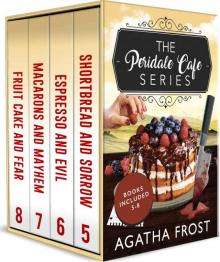 The Peridale Cafe Cozy Box Set 2
The Peridale Cafe Cozy Box Set 2 Claire's Candles Mystery 03 - Coconut Milk Casualty
Claire's Candles Mystery 03 - Coconut Milk Casualty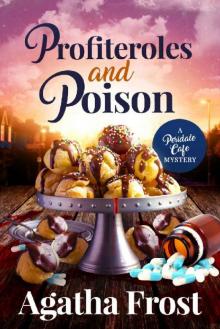 Profiteroles and Poison: A Cozy Murder Mystery (Peridale Cafe Cozy Mystery Book 21)
Profiteroles and Poison: A Cozy Murder Mystery (Peridale Cafe Cozy Mystery Book 21) The Peridale Cafe Cozy Box Set 4
The Peridale Cafe Cozy Box Set 4 Cocktails and Cowardice (Peridale Cafe Cozy Mystery Book 20)
Cocktails and Cowardice (Peridale Cafe Cozy Mystery Book 20) Vanilla Bean Vengeance (Claire's Candles Cozy Mystery Book 1)
Vanilla Bean Vengeance (Claire's Candles Cozy Mystery Book 1) Claire's Candles Mystery 01 - Vanilla Bean Vengeance
Claire's Candles Mystery 01 - Vanilla Bean Vengeance Black Cherry Betrayal (Claire's Candles Cozy Mystery Book 2)
Black Cherry Betrayal (Claire's Candles Cozy Mystery Book 2) Fresh Linen Fraud: A Cozy Murder Mystery (Claire's Candles Cozy Mystery Book 5)
Fresh Linen Fraud: A Cozy Murder Mystery (Claire's Candles Cozy Mystery Book 5) Raspberry Lemonade and Ruin: A cozy murder mystery full of twists (Peridale Cafe Cozy Mystery Book 23)
Raspberry Lemonade and Ruin: A cozy murder mystery full of twists (Peridale Cafe Cozy Mystery Book 23)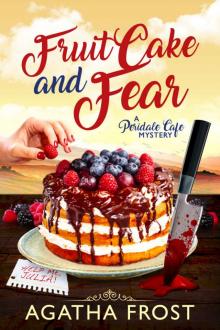 Fruit Cake and Fear (Peridale Cafe Cozy Mystery Book 8)
Fruit Cake and Fear (Peridale Cafe Cozy Mystery Book 8)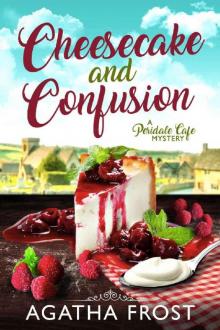 Peridale Cafe Mystery 18 - Cheesecake and Confusion
Peridale Cafe Mystery 18 - Cheesecake and Confusion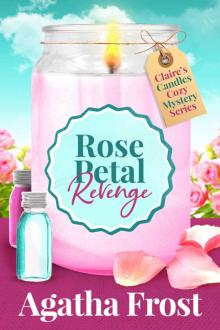 Rose Petal Revenge (Claire's Candles Cozy Mystery Book 4)
Rose Petal Revenge (Claire's Candles Cozy Mystery Book 4) The Agatha Frost Winter Anthology: 5 Festive Cozy Mystery Short Stories
The Agatha Frost Winter Anthology: 5 Festive Cozy Mystery Short Stories Brownies and Bloodshed (Peridale Cafe Cozy Mystery Book 19)
Brownies and Bloodshed (Peridale Cafe Cozy Mystery Book 19) Espresso and Evil (Peridale Cafe Cozy Mystery Book 6)
Espresso and Evil (Peridale Cafe Cozy Mystery Book 6)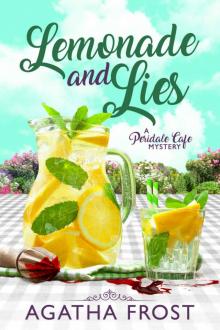 Lemonade and Lies (Peridale Cafe Cozy Mystery Book 2)
Lemonade and Lies (Peridale Cafe Cozy Mystery Book 2) Ice Cream and Incidents
Ice Cream and Incidents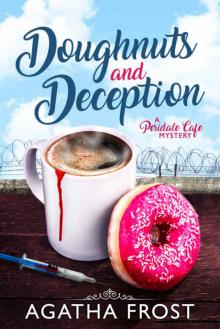 Doughnuts and Deception (Peridale Cafe Cozy Mystery Book 3)
Doughnuts and Deception (Peridale Cafe Cozy Mystery Book 3) Fruit Cake and Fear
Fruit Cake and Fear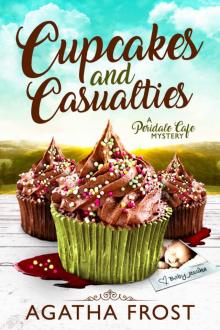 Cupcakes and Casualties
Cupcakes and Casualties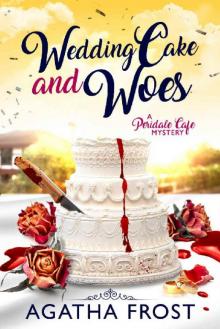 Wedding Cake and Woes
Wedding Cake and Woes Gingerbread and Ghosts
Gingerbread and Ghosts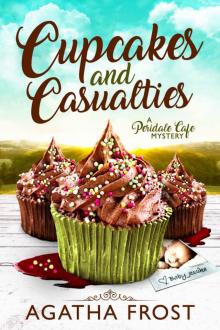 Cupcakes and Casualties (Peridale Cafe Cozy Mystery Book 11)
Cupcakes and Casualties (Peridale Cafe Cozy Mystery Book 11) Birthday Cake and Bodies
Birthday Cake and Bodies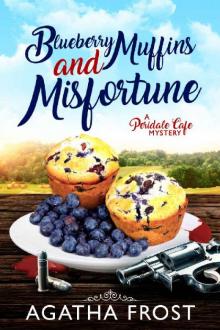 Blueberry Muffins and Misfortune
Blueberry Muffins and Misfortune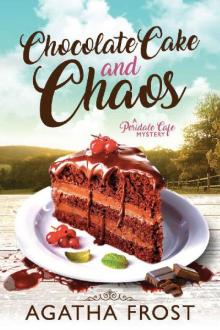 Chocolate Cake and Chaos (Peridale Cafe Cozy Mystery Book 4)
Chocolate Cake and Chaos (Peridale Cafe Cozy Mystery Book 4)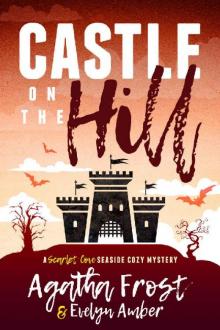 Castle on the Hill
Castle on the Hill Shortbread and Sorrow
Shortbread and Sorrow Dead in the Water (Scarlet Cove Seaside Cozy Mystery Book 1)
Dead in the Water (Scarlet Cove Seaside Cozy Mystery Book 1) Gingerbread and Ghosts (Peridale Cafe Cozy Mystery Book 10)
Gingerbread and Ghosts (Peridale Cafe Cozy Mystery Book 10) Pancakes and Corpses: A Cozy Murder Mystery (Peridale Cafe Mystery Book 1)
Pancakes and Corpses: A Cozy Murder Mystery (Peridale Cafe Mystery Book 1)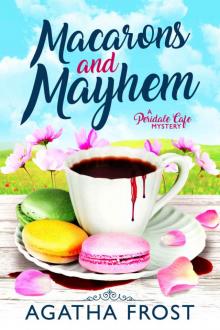 Macarons and Mayhem
Macarons and Mayhem Birthday Cake and Bodies (Peridale Cafe Cozy Mystery Book 9)
Birthday Cake and Bodies (Peridale Cafe Cozy Mystery Book 9)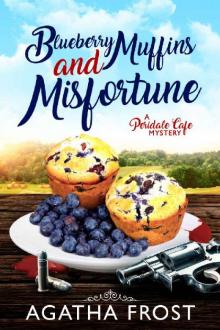 Blueberry Muffins and Misfortune (Peridale Cafe Cozy Mystery Book 12)
Blueberry Muffins and Misfortune (Peridale Cafe Cozy Mystery Book 12)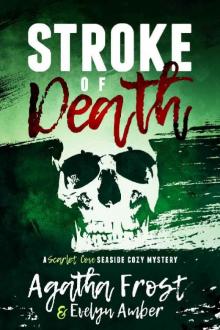 Stroke of Death
Stroke of Death